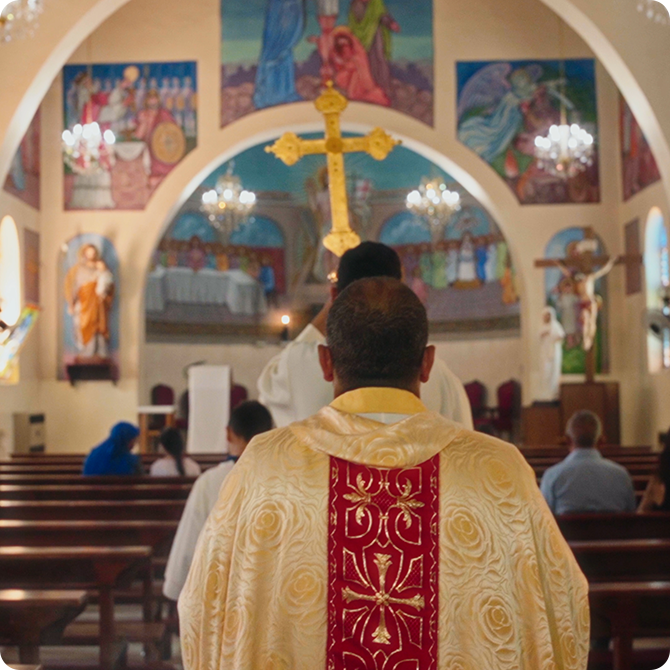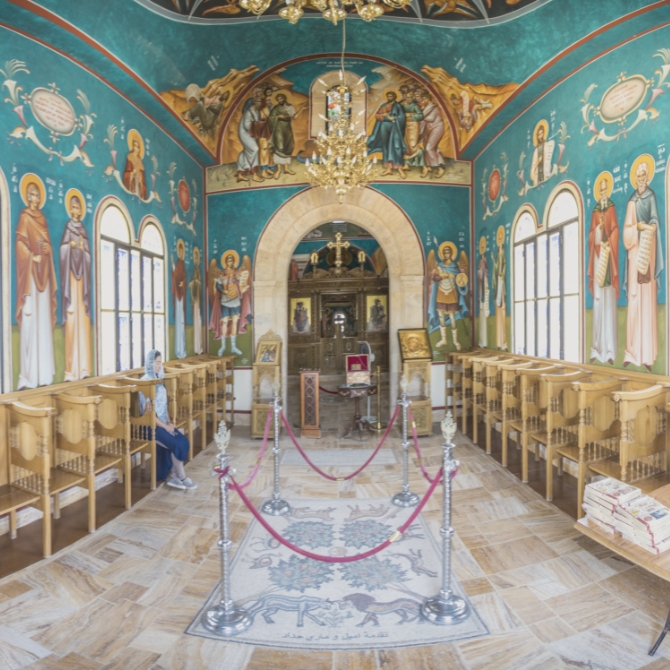
Christians have never been on the sidelines of Jordanian society, despite their small numbers. Rather, they have always been in the depths of society, an integral part of its past, present and future, and they contribute with noble openness and good citizenship in the service of society as a whole. Churches present their educational mission through more than a hundred schools and universities, without forgetting as well their charitable mission in helping the sick, the needy, the poor and refugees through many social institutions.


Jordan is an ideal destination for those seeking cultural knowledge and spiritual enrichment. It values its ethnically and religiously diverse population, and provides cultural and religious rights to all its citizens alike. The spirit of tolerance and appreciation, under the umbrella of inclusive citizenship, is one of the main elements that contribute to Jordan's stability, peace and prosperity.
More than 96% of Jordanians are Sunni Muslims, and about 4% are Christians. You can also find many Shiite and Druze residents in Jordan. Jordanian Christians are allotted at least 7% of the seats in the House of Representatives (9 seats out of 130) in addition to seats in the Senate, a much larger proportion than their share of the total population. Many Jordanian Christians occupy important ministerial portfolios, ambassadorial appointments, and high military positions.
The majority of Christians, most of whom are descended from the ancient Arab tribes, belong to the Greek Orthodox Church (an archdiocese affiliated to the Greek Orthodox Patriarchate of Jerusalem) and their number is estimated at between 125 and 300 thousand people. While the number of Catholics is 114,000, distributed among the Latin Church (and there is a Patriarchal Vicariate affiliated to the Latin Patriarchate of Jerusalem) and the Melkite Greek Catholic Church (an archdiocese headed by the Archdiocese of the Melkite Greek Catholic Patriarchate of Antioch, based in Lebanon). There are the Maronite, Chaldean, Syriac Orthodox, Catholic, Jordanian Orthodox, Catholic, Coptic Orthodox, Lutheran and Arab Evangelical Episcopal Churches.
Because of the political situation in the region surrounding the kingdom, Jordan constituted an "oasis of peace and welcome", hosting many Christians, whether from Palestine, Iraq or Syria. However, with the increase in numbers, the need arose for the establishment of churches to provide spiritual services to them. The parishes of the Armenian Orthodox, Chaldean, Syriac Catholic and Syriac Orthodox churches were established.
Jordan was also a destination for many Christians, from Arab countries, who came to the Kingdom for economic reasons for the purpose of work. To provide them with spiritual and pastoral care, the Coptic Orthodox Church (subordinate to the Coptic Orthodox Archdiocese of Jerusalem) and the Maronite Church (subordinate to the Maronite Patriarchal Vicariate in Jerusalem) were established. Many Latin churches host weekly masses for many Asian communities, such as Filipinos, Sri Lankans, and others. This is celebrated openly and freely in all Christian religious ceremonies in Jordan.
Christians in Jordan are integrated into Jordanian society. Together with their fellow Muslim Jordanians, they helped build Jordan, playing leading roles in politics, education, health, commerce, tourism, agriculture, science, culture and many other fields.
In addition to the churches, there are primary, preparatory, and secondary schools that receive everyone, Christian and Muslim students, and most of them are affiliated with the Greek Orthodox, Latin and Roman Catholic churches. Churches also have a prominent role in the field of higher education. In 1989, the Jordanian Academy of Music was established, and in 2009, Pope Benedict XVI laid the foundation stone for the University of Madaba, which is today the “American University of Madaba,” which offers higher education to many Jordanian students, Arabs and foreigners.
On the social side, the humanitarian institutions of the churches played a prominent role in providing assistance to human; Citizen, refugee and expatriate, regardless of color, gender, race and religion. So, there is the Jordanian Caritas Society, the Papal Mission, the Orthodox Society of Saint Luke, the Society of Messengers of Peace, and many other institutions and initiatives that have emerged in the face of challenges to human dignity.
It is not possible to talk about Christians in Jordan, in the past, without talking about them in the present, and the best talk on this was what was said by the Council of Heads of Churches in Jordan in 2008, which, according to the Jordanian government’s decision in 2019, represents “the only reference for all Christian affairs, and the regulation of relations with institutions of the multi-state” states: “Christian citizens are not imported from abroad, but their roots go back to the days of the apostles and the first Christian generations.”
The statement added: "Christian citizens in Jordan live their normal lives, in various cities and villages, with safety and security, and establish good social relations with the Islamic community. The difference in religion has not produced two groups in daily and social life: Islamic and Christian. Christians contribute to social, commercial and scientific life, they serve in the army, and various government institutions such as Muslim citizens. You find many of them at the forefront of intellectuals and scientifically qualified in various fields. Also, Christian religious presidencies maintain very good relations with Islamic scholars and government officials."

Jordan embraces many churches, and can be divided according to the church families that make up the Council of Middle Eastern Churches: the Orthodox Family, the Catholic Family, the Eastern Orthodox Family, and the Evangelical Family. Churches cooperate with each other through Jordan's Council of Church Presidents.